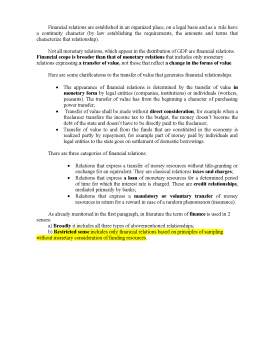Extras din curs
1.1 Theoretical approaches concerning the concept of finance
1.2 Economic content of Public Finance
1.3 Functions of finance
1.1. Theoretical approaches concerning the concept of finance. There are several expressions related to the word “finance” that we read or hear about: public finance, private finance, finance and capital markets, etc.
The word “Finance” has a Latin origin. In the texts originating from XIII and XIV centuries we may find words like finatio, financias and financial precuniaris which all mean "payment in cash”. In Germany, in the XV - XVII centuries the word Finanz is met, which also means payment in cash, and Finantzer, which describes the usurer (moneylender, broker, stingy). In France in the XV century, such expressions as hommes de finances and financiers were used, to indicate the king’s tax-gatherers and the treasurer. It is assumed that the word “finance” derives from the word “finis”, often used in the meaning of "payment period". As we know it now Finances means the entire heritage of the state and finance – income of the state. In time the word finances has acquired a broader understanding. Now it has many meanings including the state budget; crediting; monetary operations; banking and exchange operations etc.
The concept of Finance is closely related to the concept of State. It is linked to the use of money and all other forms of value in the process of national income distribution. Finance has appeared on a certain stage of society’s development. Since the emergence of the first elements of finance - the appearance of monetary relations in the early civilizations - it became part of the system of economic relations. Under the influence of changes in initial historic conditions and the developing economic environment the present concept of finance has evolved.
The conditions of formation and development of finance are:
a) The emergence and development of commodity-money relations, so as to allow the formation and use of state resources in the form of cash;
b) The emergence of state that required new resources to undertake necessary functions within the already existing relations.
In this context there are two distinct phases in the evolution of the concept of Finance:
I stage – classical – corresponding to the pre-monopolistic capitalism period.
II stage – modern – corresponding to the age of imperialism.
Classical concepts reflect the liberal doctrine, which states that business and economy should be conducted according to the principle of laissez-faire, laissez-passer. The basic tasks of public finance are: to ensure the necessary resources for maintaining the normal operations of public institutions; to keep the taxes and loans with a neutral character; to keep the balance between revenue and expenditure, which was the keystone of the policy. A budget deficit, that always generates inflation, was seen as an unwanted phenomenon.
At the stage of policeman states (stat jandarm), with the doctrine of economic liberalism prevailing, the concept of finance has a highly legal and juridical character.
According to some economists, after the Great Depression of 1929 - 1933, the policeman state is replaced by the welfare state, which broadens the scope of concern. It asserted the interventionist concept applying to the economic activity of the state, where the public authority plays an important role. This change in positions resulted in deepening external and internal contradictions of the capitalist mode of production.
For the modern state, public finances are means of intervention in the economy. According to some contemporary economists, it is the economic concept that prevails in the modern approach to public finances, according to others – the sociological concept.
In all the social-economic orders were finances existed, they appear as social relations of economic nature that exist in the process of distribution of national income. They are in close connection with the fulfillment of state functions and tasks. In all four social-economic orders finances took the form of value, money, but in each order, they have had a different role.
In the process of obtaining and allocating its resources the state needs to fulfill its duties and obligations. Out of this the social relations are developed in a society. These relations are of an economic nature and express the distribution of a part of the gross domestic product (GDP), by the state, between different social categories. These relations arising in the process of mobilizing and allocating the necessary resources of the state in the form of money, are the financial relationships or, in short, finance.
In present the sense of the word "finance" has become broader. Along with the meaning of money it comprises state budget and local budgets, banking and stock exchange, trade and compulsory or voluntary insurance of goods and people. In other words, finance should cover all economic and social spheres, in which all relations can be quantified in money terms.
When we approach the problem of "finance" in general, we agree to include within this concept credit, private finance, insurance; and when we refer to the concept of "public finance" we should include only those relations which arise between the state on the one hand, and its members, the taxpayers on the other hand. But also we include here the public and semi-public beneficiaries and sometimes monetary resources directly.
In approaching the concept of finance it is necessary to distinguish between public finances, which are associated with the state, administrative units and other public institutions, aimed at meeting the general interests of society members, and private finance, which is associated with enterprises, banks, insurance companies etc. and their financial resources intended for producing goods and services for a profit.
Preview document
Conținut arhivă zip
- Economic Content and Concepts of Finance.docx


















